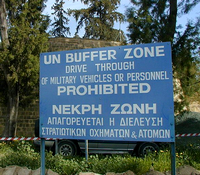On June 3, 2009, leaders of Cyprus' two communities, the Greek Cypriot south and the Turkish Cypriot north, met for the 31st time in less than nine months in the latest attempt to unlock one of the most intractable of the world's "frozen conflicts."
Days before, Turkish Republic of Northern Cyprus (TRNC) President Mehmet Ali Talat had boldly predicted that the latest round of U.N.-sponsored negotiations could result in a reunification agreement by the end of 2009. But history has taught veteran Cyprus-watchers to regard any expressions of optimism with at least a degree of skepticism. Indeed, so many false dawns have come and gone over the years that one of the greatest challenges facing anyone who attempts to break the deadlock is to overcome the sense of fatigue that quickly sets in whenever the momentum begins to falter.
Yet, when the latest negotiations began in September 2008, there did appear to be genuine grounds for hoping that this time, things would be different. Both Talat and his Greek Cypriot counterpart, Republic of Cyprus (ROC) President Demetris Christofias, were sincerely committed to a resolution and enjoyed a good personal relationship. More critically, for the first time in 35 years, Turkey had stepped back and made no attempt to influence the course of the negotiations.

